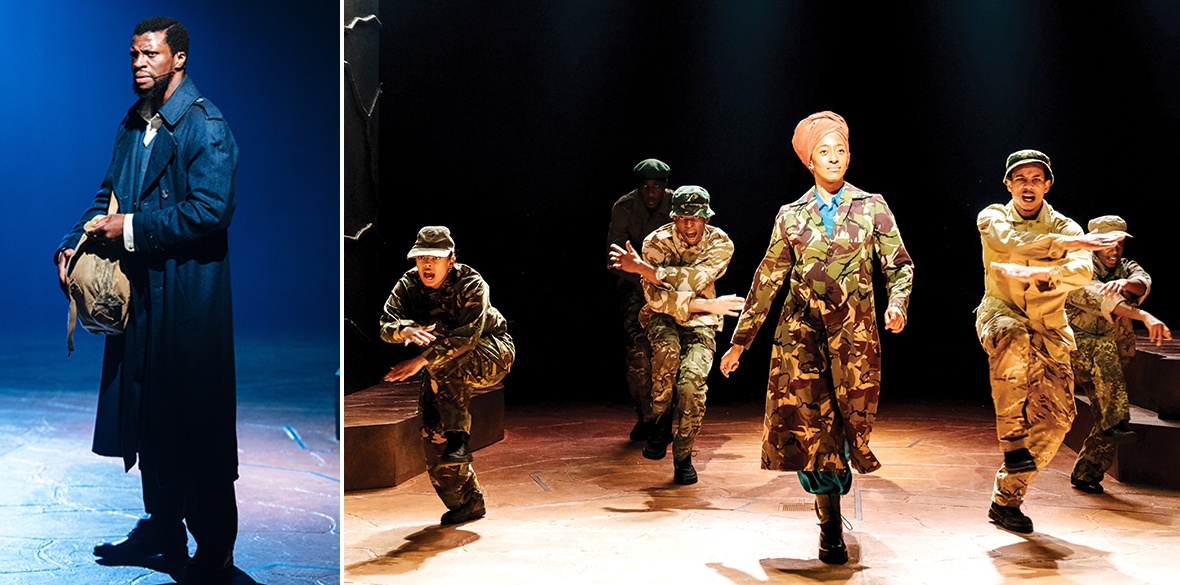This is the last article you can read this month
You can read more article this month
You can read more articles this month
Sorry your limit is up for this month
Reset on:
Please help support the Morning Star by subscribing here
Mandela
Young Vic, London
★★★
by PETER MASON
MANDELA was a name shared by two people — Nelson and Winnie — and this new musical takes that historical and emotional link as its point of reference.
Anyone expecting to see a one-eyed chronicle of Nelson’s struggle will be surprised to find that the emphasis is just as much on Winnie’s triumphs and travails.
Every scene of the distressed husband on Robben Island is matched by a concomitant consideration of the anguished wife at home, or indeed in her own actual imprisonment.
The result is a touching examination of the way apartheid tore at the heart of human relations, disrupting so many families’ lives in a way that was personified by the Mandelas’ fractured relationship.
Although politics are at its core, it’s the personal that dominates, imparting the production with a sadness that underlies the uplifting spectacle of a downtrodden majority winning a protracted battle over a powerful minority.
Even at the rousing finale, as Nelson is released from prison, the overwhelming sense is not one of joy but of aching regret that so many lives were wasted in so many ways by such a corrupt, abhorrent and pointless system.
Director Schele Williams does well to focus on the emotional impact of apartheid, because the storytelling is superficial and simplistic.
Covering a chunk of South African history spanning almost 40 years, scene after scene rushes by as we watch the breakneck journey from activism to armed conflict, from arrest to detention, and onwards towards the negotiations that led apartheid to fall.
Much gets trampled in the stampede, including some of the songs by Greg and Shaun Borowsky, at their best when capturing the vibrancy of South African musical resistance but often hardly strong enough to register an impact as the story hurtles along.
Much the same can be said for the dances choreographed by Gregory Maqoma. On the whole, though, the thin framework of Laiona Michelle’s book is well upholstered by the intensity of feeling.
There are also some fine cast performances, including from Michael Luwoye, who comes up with a remarkably good take on Nelson’s voice, and the highly impressive Danielle Fiamanya, strong, militant and vulnerable as Winnie.
Some critics have lambasted Mandela for a lack of historical and political insight, but does one go to a musical for such things?
Certainly the narrative elements hardly radiate gravitas. But the goal here is not to inform.
Mandela cannot be required to impart knowledge about apartheid any more than the Book of Mormon should provide an analysis of the origins and beliefs of the Latter Day Saint movement.
Flaws there are: the decision to range across many decades is particularly questionable, given that the story could probably have been told from a fixed point in time while making reference to past and future events.
There’s also too much singing and not enough dialogue, so that at times it feels more like an opera than a musical.
But Mandela’s strength is its decision to give equal billing to Nelson and Winnie. That, as much as anything else, generates the depth of feeling that makes it worth watching.
★★
by SIMON PARSONS
THIS highly anticipated musical always faced massive challenges in approaching the recent life of a political figure who has gained near mythical status.
The Borowsky brothers’ music and lyrics have opted for a path that eschews specifics for a drama that pits family man against political activist. Short on names, dates and political argument and big on pop opera numbers, the show gives Mandela the Les Miserables treatment without the scenery or show-stopping tunes.
The over orchestration of many of the songs and bland lyrics work against powerful performances by Michael Luwoye as Mandela and Danielle Fiamanya as his wife, Winnie, and the sentimental numbers from his children are unmemorable sugar candy that sit uneasily alongside the violence and oppression of that period.
Cursory details of the international response to apartheid and the oppressive policies of the ruling Afrikaans’ National Party are slotted into a domestic drama around Mandela’s five children and his wife’s ordeal and radicalisation.
A spirited performance from Ntsikelelo Nicholas Vani as Oliver Tambo gathering international support for the anti-apartheid movement creates more of a context to the struggle but Ryan O’Donnell’s Joe Slovo and Akmed Junior Khemalai’s Walter Sisulu are depicted as little more than fellow inmates.
The show does shift into a higher gear when traditional African rhythms and dance are introduced such as the stirring youth protests that might represent the Soweto Uprising or the Sharpeville Massacre or with Luwoye’s heartfelt delivery of part of Mandela’s famous, “I am prepared to die” speech at the Rivonia trial, but these moments are not enough to save the production.
Director Schele Williams has worked hard to extricate the man from his historical legacy and re-envision him in a family context but to turn Mandela's life into a family drama heavy on the schmaltz is to do a disservice to the larger political struggle.
Runs until February 4 2023. Box office: 020 7922 2922, youngvic.org












